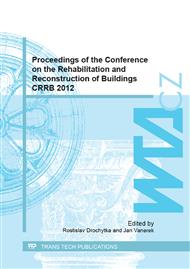p.20
p.27
p.37
p.45
p.54
p.60
p.73
p.79
p.87
Advanced, Thermal Insulation Materials Suitable for Insulation and Repair of Buildings
Abstract:
The need of quality materials for thermal insulation and restoration of building constructions is without question an up-to-date subject. Considering the growing trend in the field of reduction of building construction energy intensity and reduction of CO2 production a general assumption at development of new thermal insulating plasters is the reduction of thermal conductivity and also reduction of density in mature conditions which results in general saving of raw materials necessary for production of 1m3 of applied plaster. Aim of the paper is to acquaint readers with results of research and development of "advanced" thermal insulating plasters obtained within the cooperation of Brno Technology University and Vienna Technical University. Main object of research works was a development of plasters that would show a very good ratio of thermal insulating and mechanical properties, low density, high durability and resistance to humidity and salt influences mainly in case of its possible applications within reconstructions of existing building objects with higher moisture content.
Info:
Periodical:
Pages:
54-59
DOI:
Citation:
Online since:
May 2013
Authors:
Price:
Сopyright:
© 2013 Trans Tech Publications Ltd. All Rights Reserved
Share:
Citation:


